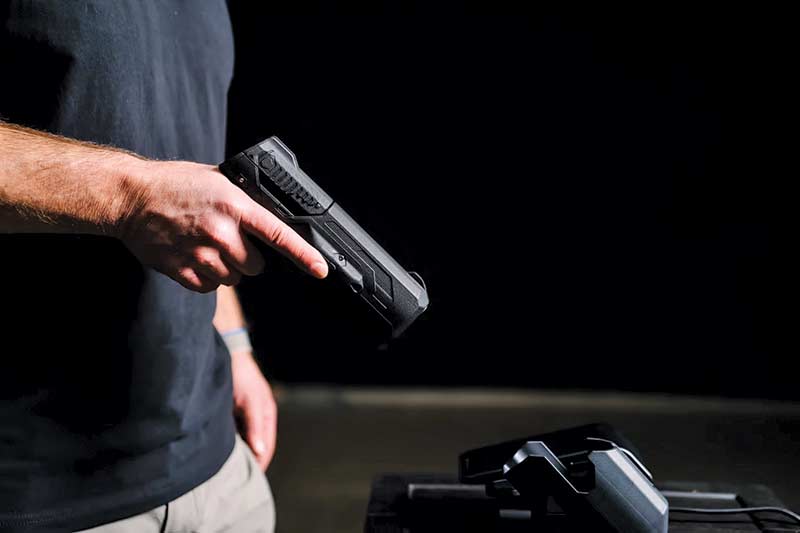Vantage Point: Inevitability Is Inevitable
Some things are inevitable. For those unpleasant inevitabilities, we have a choice: We can rage our way into a state of denial and stick our head in the sand, or we can “man up” and take on the challenge of figuring out how we’re gonna deal with the situation.
My inevitable inevitability challenge these days is … smart guns.
James Bond used them. In The Living Daylights, Timothy Dalton used a signature rifle assembled from camera parts. Yeah, Dalton was a lousy Bond in one of the cheesier movies in the franchise, but in fairness, I blame the writers — they gave him garbage material. Anyway, with its palm print recognition, he could shoot the rifle, but the bad guys who tried to kill him with his own gun were stymied. In Skyfall, 00-cool-spy-guy used a “smart” Walther pistol. Once again, a nameless henchman got ahold of it and wasn’t able to perforate our double-oh-hero because he was born with not-James-Bond’s palm prints. Nifty.
Trust Issues
In the real world, our industry seems to be, let’s say, skeptical of the prospect. I can count the number of my shooting acquaintances who are enthused about smart guns on precisely null fingers and toes. That’s not many.
The near-universal fear in our community is real — and completely understandable.
From the knowledgeable gun owner side of the discussion, many don’t trust the technology. Will it work when it’s raining, when your hands are sweaty, or when you’re bleeding from fighting off an attacker? Add infinity-plus-one more scenarios to this list — you get the idea.
People are nervous about all of these things, and rightfully so, but like all technology, those challenges will likely be solved sooner or later. It wasn’t that long ago when no one trusted the reliability of red dot sights on handguns.
Whether or not I ever trust the tech, I tend to think I’ll always prefer the flexibility for someone else to use my gun in an emergency. My wife, a friend, or a nearby good Samaritan may need to put my gun to use in a bad situation. Farfetched? Maybe, but using a gun, by definition, is a worst-case scenario event, so everything that can possibly go wrong already has. For the foreseeable future, put me in the old-fashioned mechanical pistol camp. Your mileage may vary.
Broader Concerns
If you’re an anti-gunner, you’re salivating over the idea of smart guns. What “common sense” gun control argument is more compelling than guns that can only work for one or a designated few people? I can hear the battle cry now: “Sure, gun ownership is fine, as long as it’s a smart gun!” That’s gonna be a tough one to fight in the court of public opinion, so the road to smart gun mandates is icy indeed.
I’ll bet you 50 bazillion dollars there will be a massive push for universal adoption — a mandate — as soon as viable smart guns hit the market. Will those efforts be successful? That’s up to us, and we’ll be fighting a battle against tactical nuke talking points.
Inevitable Strategy?
Here’s the thing. Smart guns are inevitable. Being cranky about them isn’t going to cause them to be uninvented or unreleased to the marketplace. There are plenty of companies out there developing the technology, and big and powerful forces are all for it. People are building them, so they will come.
From a cursory look at the emerging market, I see significant investment and support from traditionally ultra-liberal venture capitalists. Interesting. I see support from decidedly anti-gun media conglomerates — just Google “smart guns” and see who’s gushing about them. Even more interesting.
And all of this is enabled by high-tech hubris. What’s that? After spending a couple of decades working in the high-tech space, I came to learn far too many techies really do believe they know what’s best for you, and that guides their self-appointed mission of saving you from yourself. Early signs seem to indicate there are folks out there with near zero practical experience or relevant knowledge “solving problems” for gun owners. And the less-informed eat it up.
Follow the Money …
As with most things in life, if you really want to know what’s going on, follow the money. When looking at what is coming down the road, do your own research into the funding and motivation behind such initiatives. That might shed some clues on the end game.
One of the things I’m pondering is the business model behind the smart gun movement. Venture capitalists don’t lend money to do favors or take principled stands on social issues. And venture capitalists based in liberal hotbeds aren’t exactly fighting for gun rights. They’re in business for one reason — massive exit payouts.
While no investment is ever a “sure thing,” I have to believe one that comes with a push for government-mandated purchases will attract a lot of investor attention — even from those who would prefer to see you disarmed. Who wouldn’t want to invest in a product when the government is itching to mandate its purchase?
Parting Thoughts
Sure, an individual can choose whether or not to own one (assuming there’s no successful future mandate initiative), but none of us can wish them away.
What’s the ideal response? I don’t yet know, but I will embrace the inevitability “head-on” by learning a lot more about the technology, the companies involved and the motivations of the people running those companies.
I’d love to hear your thoughts on the matter, so feel free to drop me a note at [email protected].







